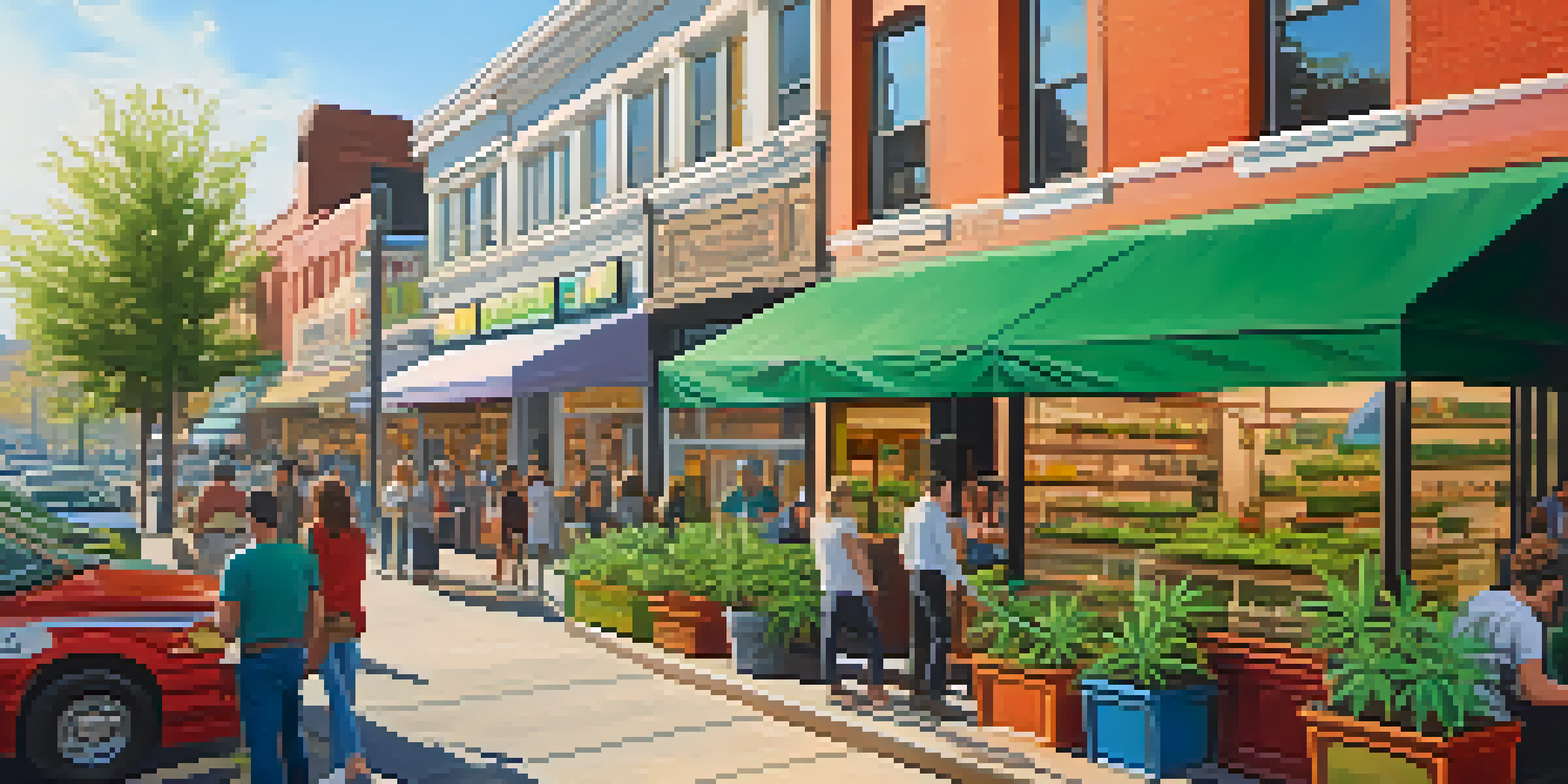Marijuana Business Zones: Revitalizing Neighborhoods Together

Understanding Marijuana Business Zones and Their Purpose
Marijuana Business Zones (MBZs) are designated areas where cannabis-related businesses can operate legally. These zones aim to create a structured environment that fosters economic growth while regulating the cannabis industry. By concentrating marijuana businesses in specific areas, local governments can manage their influence on the community effectively.
The greatest wealth is to live content with little, for there is never want where the mind is satisfied.
The primary purpose of MBZs is to ensure that cannabis operations are not just scattered throughout neighborhoods, which can lead to potential conflicts and concerns. Instead, these zones help to create a sense of order and predictability, making it easier for both businesses and residents to coexist. Imagine a farmer's market bringing fresh produce to a community; MBZs seek to create a similar positive and organized commercial environment.
Moreover, MBZs can also serve as a catalyst for revitalizing struggling neighborhoods. By attracting cannabis businesses, these zones can stimulate job creation and increase local tax revenues, ultimately benefiting the entire community.
Economic Benefits: Job Creation and Revenue Generation
One of the most significant advantages of establishing Marijuana Business Zones is the potential for job creation. Cannabis businesses require a range of positions, from cultivation and processing to retail and distribution, providing employment opportunities for local residents. As these businesses thrive, they can contribute to lowering the unemployment rate in the area.

In addition to job creation, MBZs can also generate substantial tax revenues for local governments. These funds can be reinvested into community services, infrastructure improvements, and educational programs. For instance, cities that have embraced cannabis legalization have observed increased funding for public schools and parks, enhancing the quality of life for all residents.
Economic Growth via MBZs
Marijuana Business Zones foster economic development by creating jobs and generating tax revenue for local communities.
Moreover, as more cannabis-related businesses open in these zones, the economic activity can attract other complementary businesses, such as cafes, shops, and service providers. This ripple effect can lead to a vibrant local economy, fostering an interconnected community.
Community Engagement: Building Trust and Transparency
For Marijuana Business Zones to be successful, community engagement is crucial. Local governments and businesses must work together to build trust and transparency, ensuring that residents feel involved in the decision-making process. This can be achieved through town hall meetings, surveys, and open dialogues about the potential impacts of MBZs.
A community is like a ship; everyone ought to be prepared to take the helm.
When residents are informed and involved, they are more likely to support the establishment of MBZs. Engaging the community fosters a sense of ownership and pride, as people see their input valued in shaping the future of their neighborhoods. It’s akin to a community garden where everyone contributes, leading to a bountiful harvest that benefits all.
Furthermore, positive community engagement can help dispel myths and misconceptions about cannabis businesses. By providing accurate information and addressing concerns, local governments can alleviate fears and promote understanding, paving the way for a harmonious coexistence.
Addressing Concerns: Safety and Regulation
While the benefits of Marijuana Business Zones are clear, concerns regarding safety and regulation often arise. Residents may worry about increased crime rates, traffic congestion, or the impact on local youth. To address these concerns, it’s essential for local governments to implement strict regulations governing cannabis businesses within these zones.
Regulatory measures can include limits on the number of dispensaries, hours of operation, and security requirements. By establishing these guidelines, communities can ensure that cannabis businesses operate responsibly and contribute positively to the neighborhood. Think of it like setting rules for a community playground; proper guidelines help maintain a safe and enjoyable environment for everyone.
Community Engagement is Key
Successful implementation of MBZs relies on active community involvement and transparent communication between residents and local governments.
Moreover, the presence of cannabis businesses in designated zones can actually enhance safety. With regulated operations, businesses are more likely to invest in security measures, such as surveillance cameras and on-site personnel, creating a safer atmosphere for all residents.
The Role of Education: Informing the Community
Education plays a vital role in the successful implementation of Marijuana Business Zones. Providing residents with accurate information about cannabis, its uses, and the regulations surrounding it can foster a more informed community. Educational initiatives can include workshops, informational brochures, and online resources that demystify cannabis and its economic potential.
When communities are educated about cannabis, they can make informed decisions and participate actively in discussions about MBZs. This understanding can help to reduce stigma and promote a more accepting attitude toward cannabis businesses. Picture a neighborhood learning about healthy eating; the more they know, the better choices they can make.
Additionally, educational programs can also address responsible consumption and safety practices, ensuring that residents are well-informed about the implications of cannabis use. By prioritizing education, communities can create a supportive environment that embraces the benefits of MBZs.
Examples of Successful Marijuana Business Zones
Several cities across the United States have successfully implemented Marijuana Business Zones, showcasing the positive impact they can have on communities. For instance, Denver, Colorado, has established designated areas for cannabis businesses, leading to increased tax revenue and job creation while maintaining community standards.
Similarly, Portland, Oregon, has seen the emergence of vibrant cannabis districts that not only support local businesses but also engage residents through community events and educational programs. These successful examples illustrate how well-planned MBZs can revitalize neighborhoods and stimulate economic growth.
Education Reduces Stigma
Informing the community about cannabis and its regulations can help dispel myths and promote a more accepting attitude toward cannabis businesses.
Moreover, these cities demonstrate that with the right regulations and community involvement, Marijuana Business Zones can serve as hubs of innovation and sustainability. They highlight the potential for cannabis businesses to coexist with other local enterprises, creating a diverse and thriving economic landscape.
Future Prospects: Expanding the Concept of MBZs
As more states consider legalizing cannabis, the concept of Marijuana Business Zones is likely to expand. Local governments can look to existing successful models to design their own MBZs, tailoring them to fit the unique needs of their communities. This adaptability is essential for fostering a positive relationship between cannabis businesses and residents.
With an eye toward the future, communities can explore innovative ways to integrate MBZs into their urban planning strategies. This could include creating mixed-use developments that combine cannabis businesses with residential and commercial spaces, promoting a sense of community and accessibility. Imagine a neighborhood where shops, cafes, and cannabis dispensaries coexist harmoniously.

Ultimately, the future of Marijuana Business Zones lies in collaboration and flexibility. By working together, local governments, businesses, and residents can create thriving neighborhoods that benefit everyone, paving the way for a more inclusive and prosperous community.